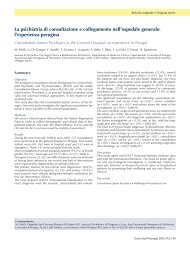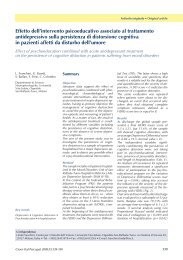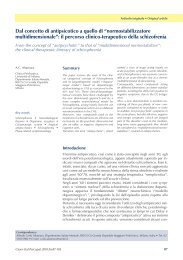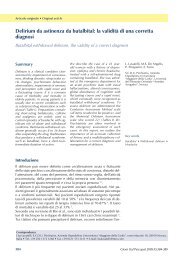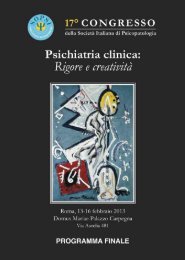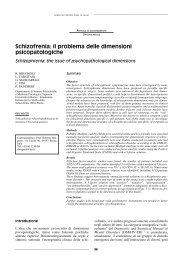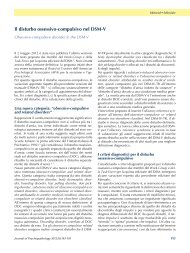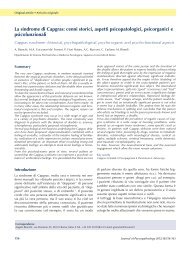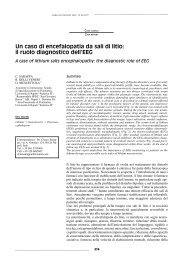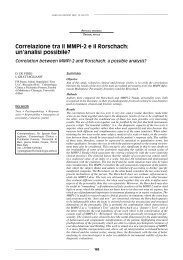XI Congresso della Società Italiana di Psicopatologia Psichiatria ...
XI Congresso della Società Italiana di Psicopatologia Psichiatria ...
XI Congresso della Società Italiana di Psicopatologia Psichiatria ...
Create successful ePaper yourself
Turn your PDF publications into a flip-book with our unique Google optimized e-Paper software.
SIMPOSI TEMATICI<br />
Conclusioni: allo stato attuale sono ancora scarse le evidenze<br />
scientifiche che provano l’utilità dell’impiego del<br />
Problem-Solving Training. Una sfida <strong>di</strong> interesse è quella <strong>di</strong><br />
condurre e promuovere stu<strong>di</strong> che contribuiscano a <strong>di</strong>mostrare<br />
l’efficacia <strong>di</strong> tale strategia terapeutica nella ripresa <strong>di</strong> <strong>di</strong>sturbi<br />
schizofrenici.<br />
Bibliografia<br />
1 Barbieri L, Boggian I, Lamonaca D. La ricerca multicentrica C.D.<br />
5: confronto e valutazione tra interventi verbali e pratico manuali<br />
nei Centri Diurni. SIRP congresso, Milano 28 gennaio, 2005.<br />
Dal problem-solving al funzionamento<br />
sociale: esiti a 12 mesi <strong>di</strong> un trattamento<br />
cognitivo-comportamentale familiare<br />
R. Roncone, M. Mazza, R. Pollice, I.R.H. Falloon,<br />
P. Morosini * , M. Casacchia<br />
Clinica Psichiatrica, Università de L’Aquila; * Istituto Superiore<br />
Sanità, Roma<br />
Lo stu<strong>di</strong>o controllato randomizzato multicentrico “Coinvolgimento<br />
e sostegno dei familiari delle persone affette da <strong>di</strong>sturbi<br />
mentali gravi”, in sinergia con il Progetto Nazionale<br />
Salute Mentale, ISS Roma, ha valutato la conduzione del<br />
trattamento psicoeducativo familiare condotto nei Dipartimenti<br />
<strong>di</strong> Salute Mentale mettendo a confronto due <strong>di</strong>verse<br />
modalità <strong>di</strong> effettuazione dell’intervento psicoeducativo familiare<br />
integrato che utilizzano ampiamente strategie <strong>di</strong><br />
Problem-Solving Training (trattamento <strong>della</strong> famiglia singola<br />
secondo il metodo <strong>di</strong> Ian Falloon vs. trattamento multifamiliare<br />
<strong>di</strong> gruppo + incontri con la singola famiglia). È stato<br />
effettuato il follow-up a 6 e 12 mesi; tutte le valutazioni<br />
sono state effettuate da “valutatori” in<strong>di</strong>pendenti, ovvero<br />
specializzan<strong>di</strong> <strong>della</strong> Clinica Psichiatrica dell’Università de<br />
L’Aquila, specificatamente addestrati alla somministrazione<br />
degli strumenti inclusi nel protocollo, con un alto grado <strong>di</strong><br />
riproducibilità nelle valutazioni. Previo accordo con le<br />
U.O., gli specializzan<strong>di</strong> hanno visitato ogni 6 mesi i servizi<br />
per effettuare le valutazioni con i pazienti ed i familiari.<br />
I risultati ad un anno evidenziano una buona efficacia del<br />
trattamento in merito: alla riduzione <strong>della</strong> sintomatologia, al<br />
miglioramento del funzionamento sociale, alla riduzione del<br />
carico assistenziale ed al miglioramento <strong>della</strong> qualità <strong>della</strong><br />
vita dei familiari.<br />
Non abbiamo evidenziato <strong>di</strong>fferenze rispetto ai due interventi<br />
familiari condotti.<br />
La ricerca ha indagato inoltre l’impatto sulle variabili neuropsicologiche,<br />
mostrando un buon livello <strong>di</strong> “reme<strong>di</strong>ation”<br />
sulle principali componenti <strong>della</strong> neurocognizione 1 2 . Rispetto<br />
al gruppo <strong>di</strong> controllo, dopo i 12 mesi <strong>di</strong> trattamento<br />
(in<strong>di</strong>pendentemente dal tipo <strong>di</strong> trattamento fornito SF/MF) i<br />
pazienti mostrano un buon miglioramento nella: cognizione<br />
sociale, prestazioni ai test ToL e WCST, fluenza verbale.<br />
In conclusione, i nostri risultati mostrano che gli interventi<br />
psicoeducazionali integrati migliorano anche le variabili cognitive.<br />
Bibliografia<br />
1 Roncone R, Morosini PL, Falloon IRH, Casacchia M. Family interventions<br />
in schizophrenia in Italian mental health services.<br />
In: Kashima H, Falloon IRH, Mizuno M, Asai M, eds. Comprehensive<br />
Treatment of Schizophrenia. Linking Neurobehavioral<br />
Fin<strong>di</strong>ngs to Psychosocial Approaches. Tokyo: Springer<br />
2002, p. 284-289.<br />
2 Roncone R, Falloon IRH, Mazza M, De Risio A, Pollice R,<br />
Necozione S, et al. Is social cognition associated more strongly<br />
with clinical and social functioning in schizophrenia than neurocognitive<br />
deficits? Psychopathology 2002;35:280-8.<br />
Improving vocational and social recovery<br />
in people with early psychosis: can we do<br />
better?<br />
D. Fowler<br />
Professor of Social Psychiatry, University of East Anglia,<br />
Consultant Clinical Psychologist and Project Lead, Norfolk<br />
Early intervention Service<br />
Exciting new developments in the psychological and pharmacological<br />
treatment of psychosis have already led to improvements<br />
in the symptomatic course of psychosis. However,<br />
the effects on social outcome are less clear. In tra<strong>di</strong>tional<br />
services only a minority of people with psychosis return<br />
to stable patterns of work or education. As a consequence<br />
the lives of young people can be <strong>di</strong>srupted at a crucial<br />
stage in a manner which can make social recovery in the<br />
long term a struggle. Aspects of psychotic illness can make<br />
some people sensitive to stress. In recognising this many<br />
clinicians and sufferers themselves have been understandably<br />
cautious about recommen<strong>di</strong>ng a return to activities associated<br />
with stress which can often include work and education.<br />
However, the effect of withdrawal can lead in turn to<br />
the severe stress of unemployment and social isolation. In<br />
helping people the way forward may be understan<strong>di</strong>ng the<br />
nature of the stress in psychosis and fin<strong>di</strong>ng the right balance<br />
between strategic withdrawal and activity. We are currently<br />
conducting research evaluating a new intervention:<br />
Social Recovery oriented Cognitive Behaviour Therapy.<br />
This approach combines the latest approaches in vocational<br />
rehabilitation which focus on in<strong>di</strong>vidualised work placement<br />
(In<strong>di</strong>vidual Placement and Support) with stress and<br />
symptom management techniques derived from cognitive<br />
behaviour therapy. This lecture <strong>di</strong>scusses the rationale for<br />
the approach, describes promising preliminary results from<br />
work in the Norfolk Early Intervention Service and current<br />
research inclu<strong>di</strong>ng a randomised controlled trial.<br />
Trattamento a lungo termine <strong>della</strong><br />
Schizofrenia con clozapina: continuità <strong>di</strong><br />
miglioramento nel funzionamento globale<br />
in un gruppo <strong>di</strong> 122 pazienti valutati<br />
retrospettivamente per 6 anni<br />
R. Delle Chiaie * ** , F. Marra * , M. Salviati * , P. Pancheri *<br />
* III Clinica Psichiatrica, Università “La Sapienza”, Roma;<br />
** Istituto <strong>di</strong> Psicologia Clinica, Università <strong>di</strong> Siena<br />
La clozapina ha <strong>di</strong>mostrato una superiorità <strong>di</strong> efficacia sui<br />
sintomi positivi e negativi rispetto agli altri antipsicotici, sia<br />
convenzionali che atipici. Secondo l’opinione <strong>di</strong> molti clini-<br />
48



